Can I get a good New York bagel at... Russ & Daughters
They're one of New York City's iconic "appetizing stores" but are the bagels still appetizing?
Welcome to It’s A Shanda, one Northeastern Jew’s quest to find a decent bagel in Seattle (and beyond). If you’re interested in taking this journey with me, make sure you subscribe so you never miss a review. If you want to ensure I review any specific bagels (or want to let me know why I’m wrong), you can email me at seanmatthewkeeley@gmail.com.
I was hoping that the first name of Russ & Daughter’s founder was Russ because I liked the idea of a guy named Russ slinging kosher food in 1900s New York City. Alas, the titular Russ is Joel Russ, a Jewish immigrant who arrived from Poland sometime around 1905 with dreams of catering to his fellow Jews settling in the Lower East Side.
What started as a pushcart where he sold mushrooms and pickled herring eventually became the J Russ International Appetizers storefront. They became synonymous with deli classics like herring, smoked salmon, caviar, and rugelach. In 1914, they began selling bagels and lox. In 1920, the business moved to the current location of their main store at 179 East Hudson Street. In 1933, his three daughters (Hattie, Anne, and Ida) became partners in the business and it was renamed Russ & Daughters.
Now, I know what you’re thinking. Joel Russ: feminist icon and smasher of the patriarchy? Well, the truth is that it was the 1930s and Joel was a firm believer in parnassa (Hebrew for “making a living.”). The survival of the family business was what mattered most, hence the family WAS the business. Hattie would say that she and her sisters worked at the store "since they were 8 years old" after school and on weekends (it was open seven days a week). And once they graduated high school, they all worked at the store full-time.
So entrenched was the business in family dealings that whenever a man wanted to marry one of his daughters, he would size them up based on how well they would be able to work in the deli.
“Was he strong enough to schlep barrels of herring? Smart enough to add up a column of numbers on a brown paper bag? Could he make change? Would he look good behind the counter?” If so, “Fine, you can marry him,” said grandson Mark Russ Federman.
So entrenched in the lore of New York deli culture is Russ & Daughters, there’s even a documentary about Hattie, Anne, and Ida called The Sturgeon Queens.
Russ & Daughters remained a New York institution over the years and also stayed in the family. Joel passed it down to the daughters, who then passed it to Mark (Anne’s son), who then passed it to his daughter Niki and nephew Josh.
Federman once told the New York Times that one of the keys to good business in New York was knowing how to properly schmooze.
The perfect schmooze “must be a seamless resumption of your last conversation, even if the customer’s last visit was six months ago.” A truly great schmoozer, he adds, “will attempt to bring other customers into the schmooze. When two or more customers are introduced into the schmooze, they are likely to discover things they have in common.”
Beware faking it, though. “You’re either born a schmoozer or you’re not,” Mr. Federman says. For the rest of us he offers this solace: “The schmoozing gene will soon be mapped.”
The shop made an appearance on the 'Disappearing Manhattan' episode of Anthony Bourdain: No Reservations, though with four locations, including one near the trendy Hudson Yards neighborhood, coupled with an unending supply of nostalgic appreciation for this iconic “appetizing store,” it doesn’t seem like Russ & Daughters is going anywhere.
For all the love, all the hype, all the nostalgia, all the schmoozing, and all the accolades… are the bagels still among the best in New York City? That’s what we’re here to find out.
And if you want to know how I define a good bagel, you can find that here.
WHAT I ORDERED
Plain bagel as-is
Everything bagel with scallion cream cheese.
THE EXPERIENCE
As soon as I walked into the Houston Street store, I understood why people still flock here. It really does transport you back in time. And that’s before you take a ticket and wait impatiently for one of the counterpeople to call it out so you can make awkward eye contact with him and start ordering.
Everything you could possibly want from a Jewish deli counter was present and accounted for. All kinds of smoked salmon. Various salads and dips. Chopped liver. More herring preparations than I understood to be possible.
One thing I didn’t see in the glass case was bagels. Nor did I see any baskets brimming with fresh-out-the-oven bagels to tease waiting customers. There were some bagels on the shelves behind the counter but they seemed to be more for show. Instead, I noticed a large plastic bag in the back corner that workers would grab bagels out of as needed.
Uh-oh.
And then they asked if I wanted the bagels toasted.
UH-OH.
UPON FIRST GLANCE
When I sat down to unwrap my bagels and begin eating, I was greeted with a plastic sheet strewn across the top. What in the 1937 is this? I suppose the idea here is that it keeps the schmears from smearing all over the paper. But if you’ll allow me to sound like the woke coastal elite that I am, I think we can let unnecessary plastic sheets go from our food presentation.
Between the plastic bag full of bagels and the plastic sheet on the bagel, I was pretty sure that quality and care were going to be an issue here.
TOP
The very uniform plain bagel was a light golden brown. It was very soft on the touch and I couldn’t detect any crispness. While there was some slight bubbling and a few crevices, it felt very smooth all the way around.
As for the everything, they had a decent seed hand, with a smattering of seeds and seasoning that still left a lot of empty space. The bagel itself was a bit more golden brown than the plain. But just like the plain, it was very soft to the touch on top.
BOTTOM
The bottom of the plain bagel featured some blisters and looked well-cooked but was also fairly soft to the touch. Same for the everything bagel, which had a little bit of seasoning but had a softness that implied a real lack of texture.
INSIDE/BITE
The plain bagel was indeed a tough but soft rip. There was no crispness to be found. The bite was very doughy and I didn’t detect any texture. While I did appreciate the good bagel smell, it ended up being a pretty tough bite overall and not in a good way.
As for the everything bagel, it was also a tough bite. The difference here was that the cream cheese offered a saving grace. It had a good taste and I detected some scallion flavor in there. It was also a very strong cream cheese application which held up extremely well to each bite because it was cold. There was just enough everything flavor here as well to make it a more enjoyable experience than the plain.
FINAL THOUGHTS
I wrote last week about how I think people get bagels at the “old-school” New York places and, because they’re not that good, come away thinking that the bagels in their city are just as good. It didn’t take a detective to notice that I was heavily implying Russ & Daughters was an example of this theory.
The New York bagel scene: Let the past die
Welcome to It’s A Shanda, one Northeastern Jew’s quest to find a decent bagel in Seattle (and beyond). Along with free bagel reviews every Sunday, we also offer bonus posts each Wednesday. If you’re already subscribed, I hope you’ll consider upgrading to a
The experience at Russ & Daughters reminded me a lot of Zabar’s, another NYC institution. They’re iconic and one of the first places people think of when they think of New York bagels. Have you ever gotten Zabar’s bagels sent to you? They’re abysmal. Flavorless, stale gut bombs. But they get by just fine on the nostalgia and reputation they created 100 years ago.
I actually wondered whether or not Russ & Daughters even still make their own bagels because it seemed like a bit of an afterthought. On their website, they say they “bake all of our own bagels” in the Brooklyn store, but a 2014 Eater NY article says they get their bagels from Brooklyn's The Bagel Hole. If that’s still true, remind me to skip The Bagel Hole.
I have a feeling a lot of the other offerings at Russ & Daughters are still worth it. They seem to have everything you could want when preparing a Jewish brunch spread. But my two cents would be to grab your Sunday morning dozen elsewhere.
Is It Good Enough For The Goys?
I can only imagine how many goyim flow through these doors every year to get the authentic Jewish deli experience. I’ve seen enough YouTube videos and aggregated lists out there that proclaim Russ & Daughters the best bagel in New York to know that they’re doing just fine here.
Is It Good Enough For Northeastern Jews?
If I lived in Manhattan and had daily access to some of the best bagels in the world, I would not go to Russ & Daughters. Maybe they should be your go-to for chopped herring salad, but you can do so much better.
MY SEATTLE BAGEL RANKINGS SO FAR (9/3/23)
OUTSIDE SEATTLE BAGEL RANKINGS
The Bagelry (Bellingham)
Howdy Bagel (Tacoma)
Coquette Bake Shop (Bainbridge Island)
Otherside Bagel Co. (Bellingham)
Whidbey Island Bagel Factory (Mt. Vernon, Whidbey Island)
NEW YORK AREA BAGEL RANKINGS
Russ & Daughters
Thanks for actually reading this far. If you enjoyed my bagel review and want to read more of them, make sure you’re subscribed to It’s A Shanda. Know someone in the Greater Seattle Area (or beyond) who would appreciate way-too-detailed reviews of local bagels? Forward the link their way.

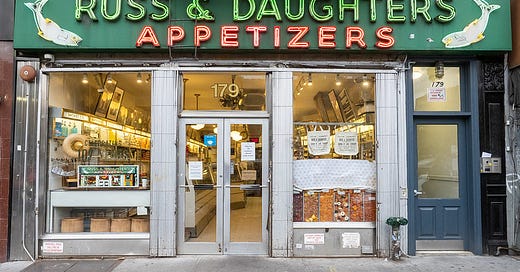



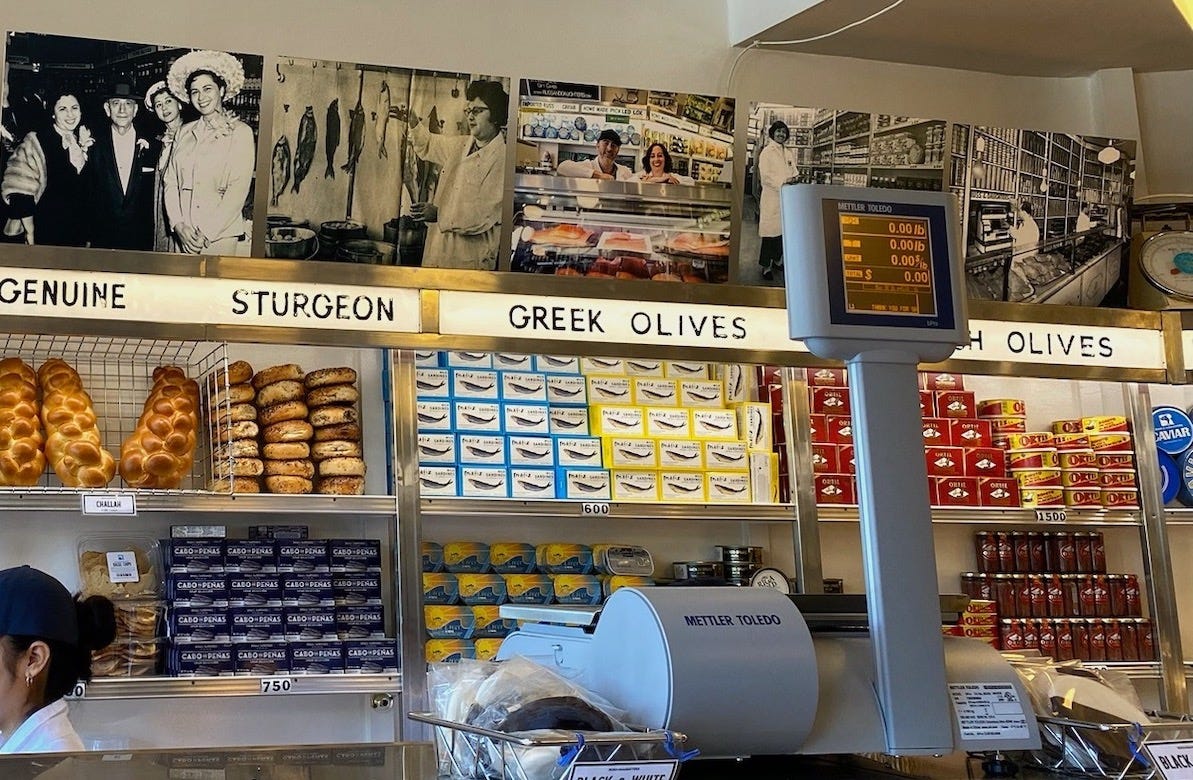
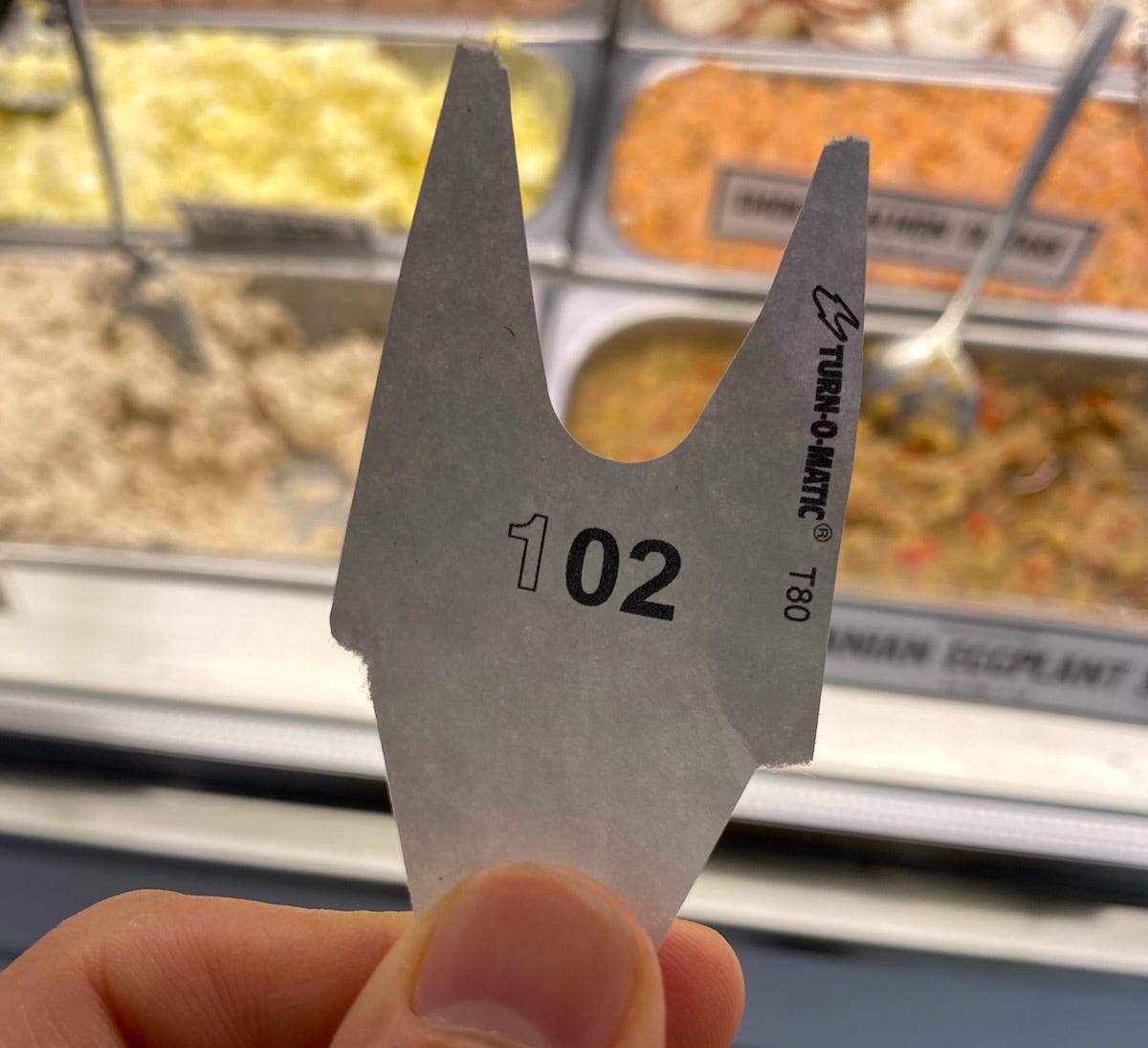
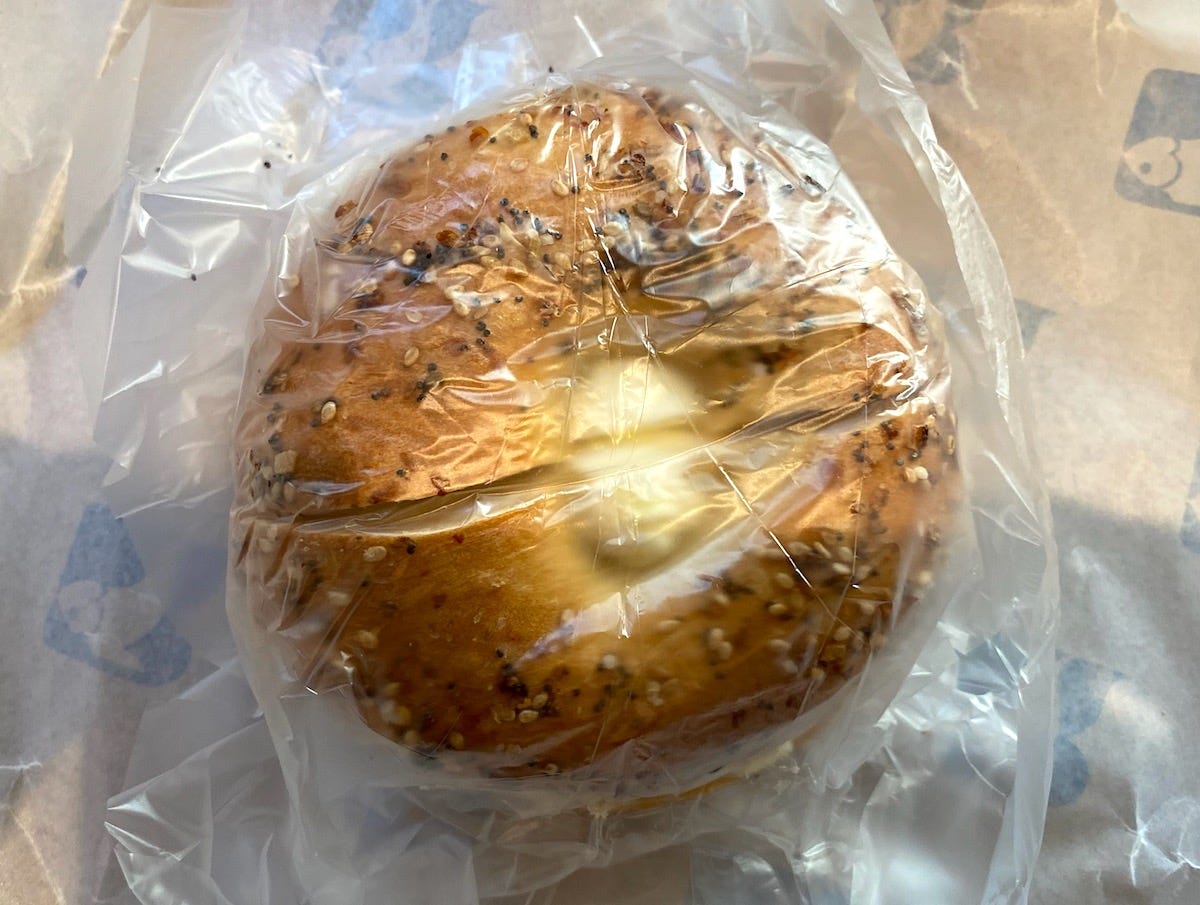
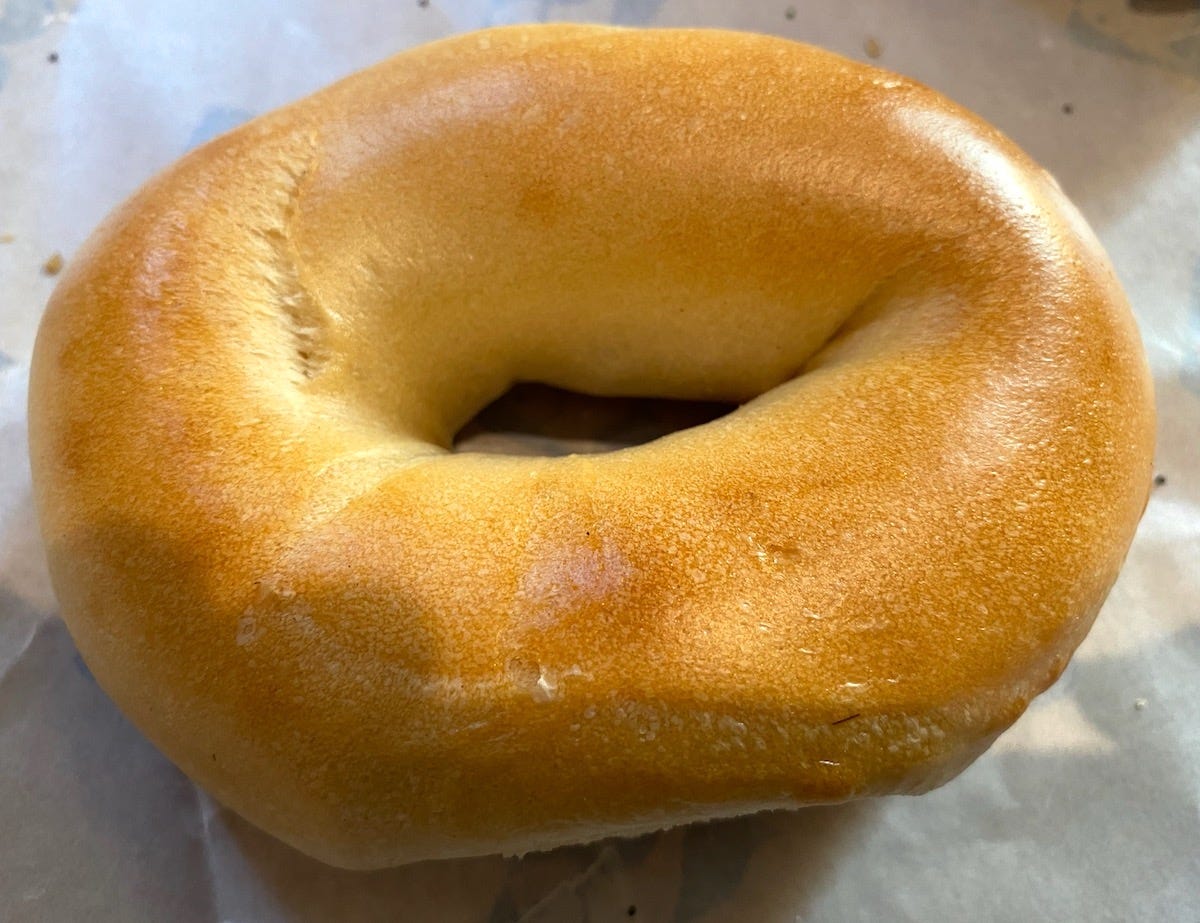
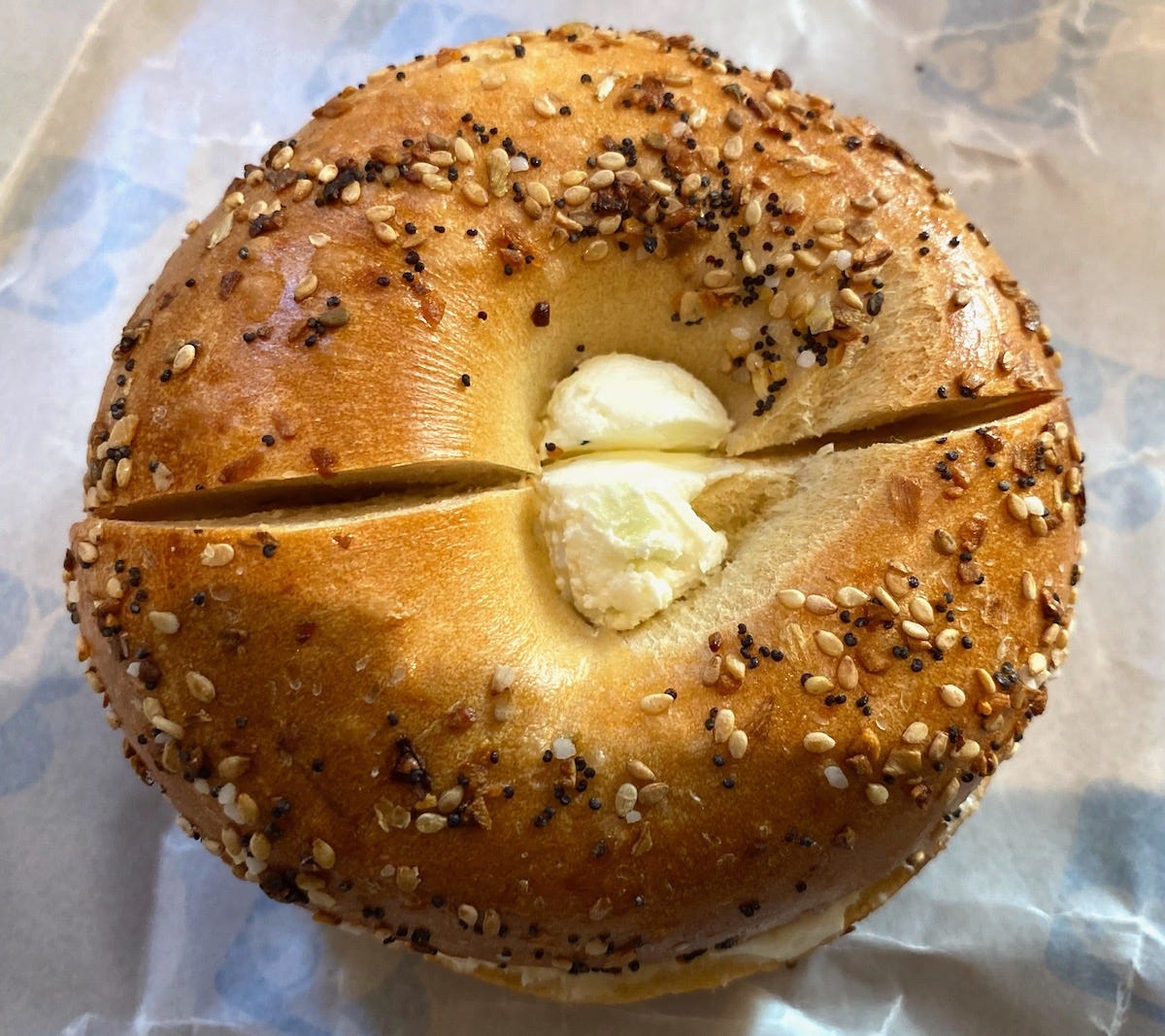
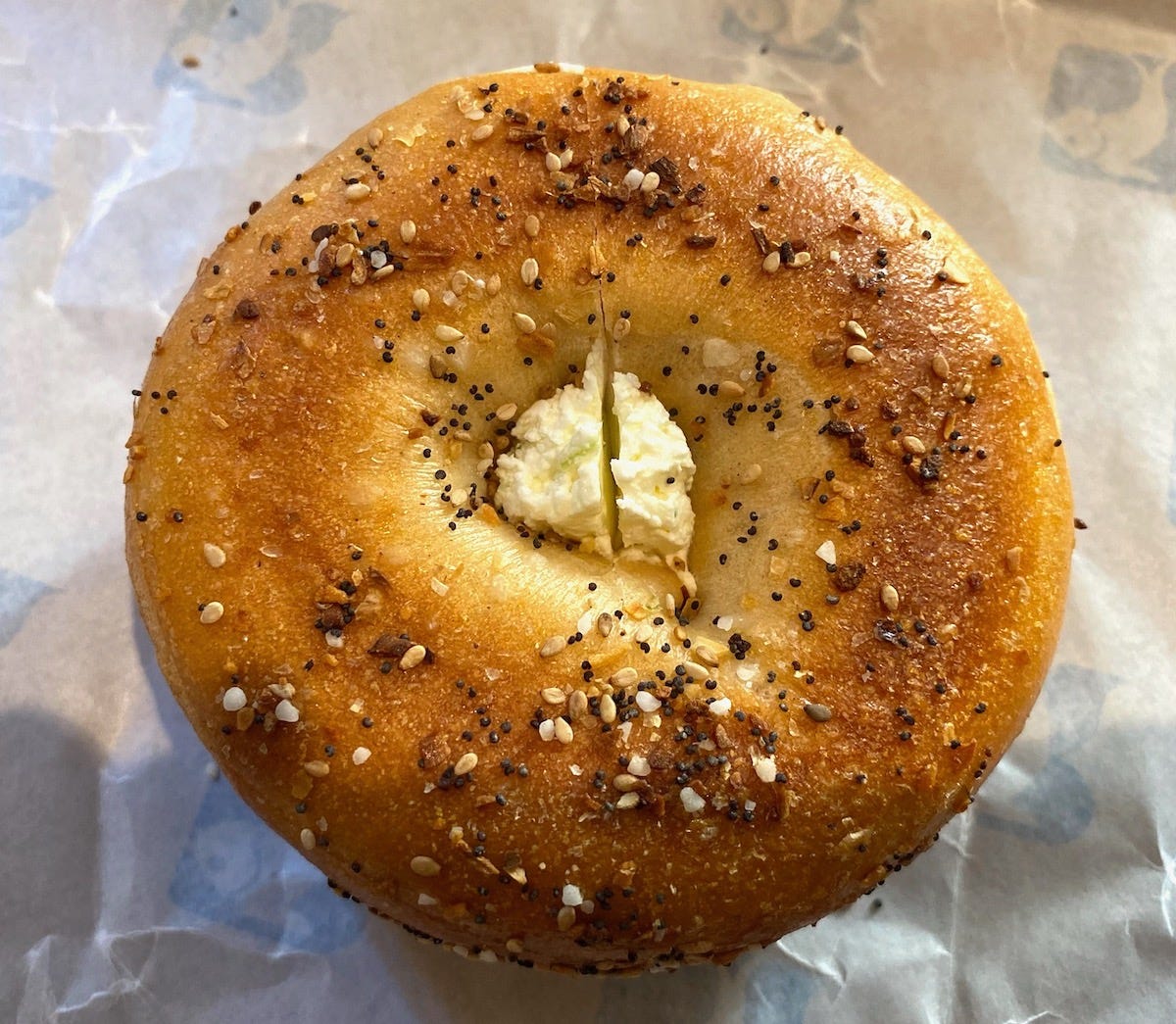
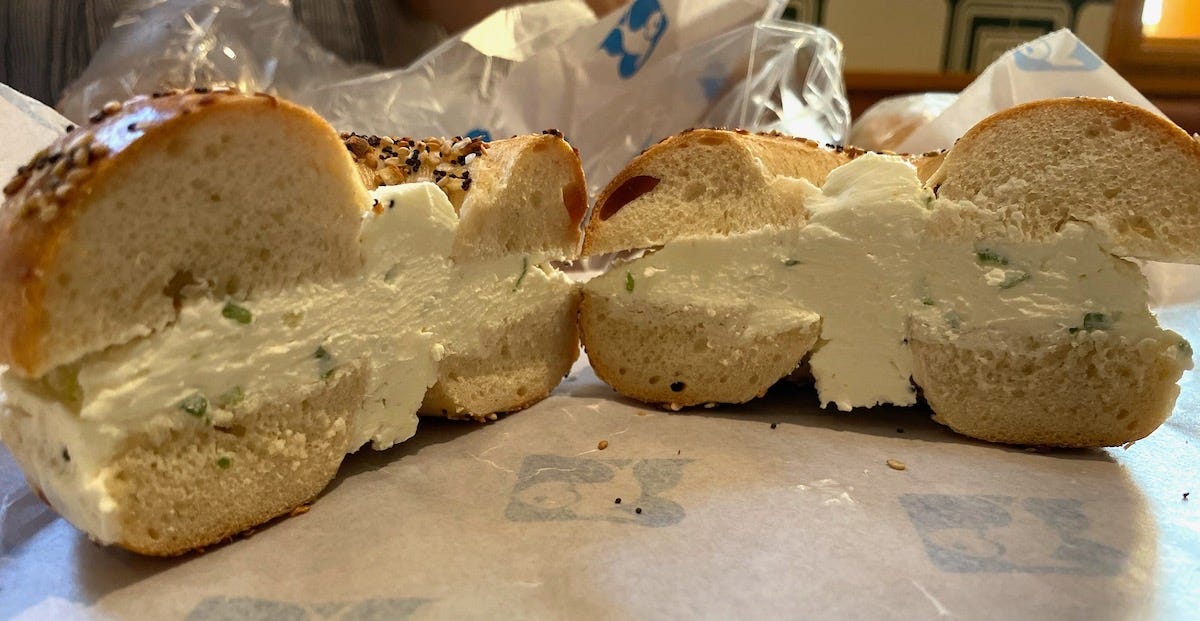
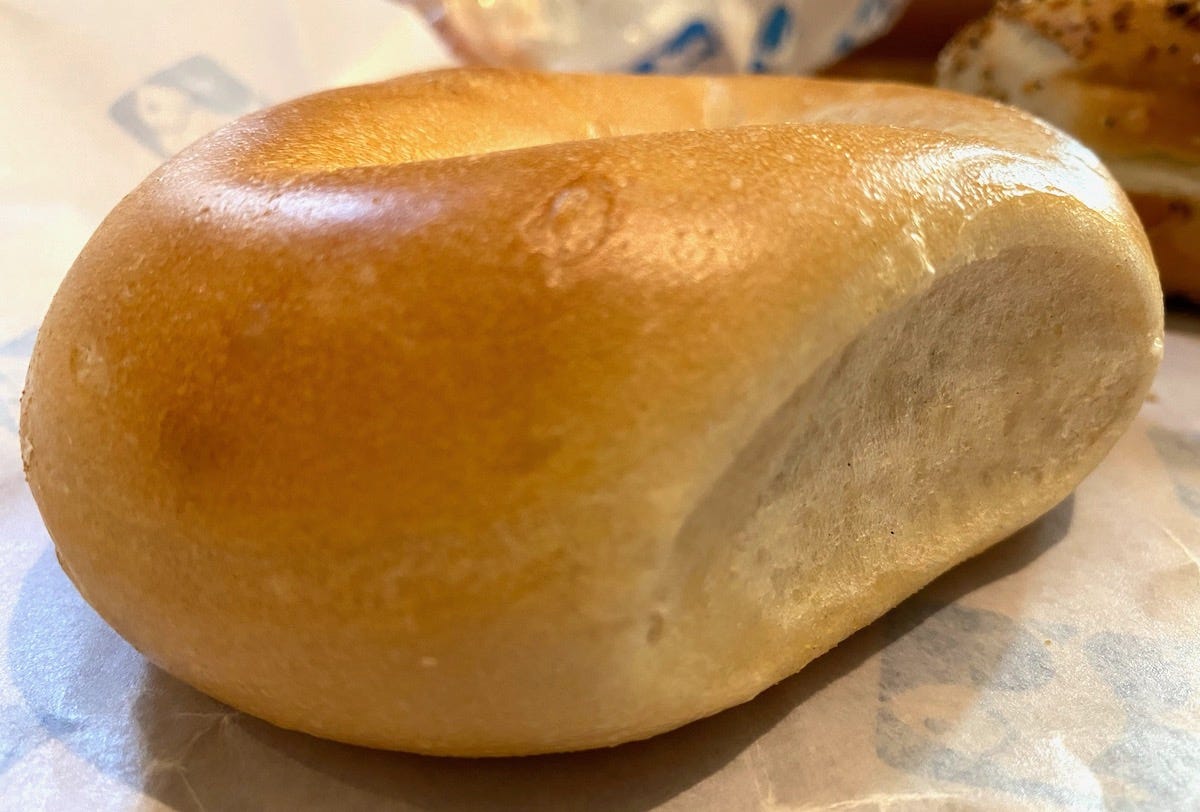

I have this theory - that I made after going to Russ and Daughters and being convinced the city was gaslighting me - that any business that is heavily associated with a cool city - like NYC - is always going to be overrated because it can coast on the city’s reputation. The best food places are from, like, Cleveland because if you’re from Cleveland, your food better be good.
Just tried R and D (Hudson Yards location) for first time - this NE Jew is in full agreement with your review - bagels are nothing special. As another commenter said, Liberty bagels are better - although avoid the midtown location which literally has a bouncer outside to manage the lines to get into the store (their bagels are good but not worth a 30-45 min wait for an online order you put in the day before) - just saying folks